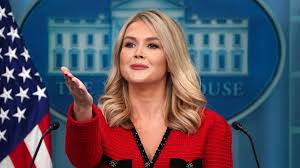Karoline Leavitt: A Rising Star in New Hampshire Politics

Introduction
Karoline Leavitt, a young Republican candidate, has been capturing attention in New Hampshire’s political landscape. As a former White House aide and a passionate advocate for conservative values, her candidacy is noteworthy not only for her policies but also for her age, making her one of the youngest contenders in recent state elections. With increasing interest in the role of youth in politics, Leavitt’s journey is particularly relevant amid ongoing discussions about generational change and representation in governance.
Background and Political Involvement
Born in 1998, Karoline Leavitt grew up in a politically active family, which laid the groundwork for her interest in public service. She graduated from the University of New Hampshire and later worked for the Trump administration as an assistant press secretary, gaining valuable experience in political communication and strategy. In 2022, she ran for the U.S. House of Representatives but narrowly lost in a challenging campaign against Democratic incumbent Chris Pappas. Her resilience and determination, however, have solidified her status as a key figure in New Hampshire politics, and she is set to run again in the upcoming election.
Current Campaign and Policies
Leavitt’s current campaign focuses on key issues such as economic development, fiscal responsibility, and conservative values, resonating with a growing cohort of voters seeking leadership that reflects their priorities. She highlights the importance of job creation, advocating for policies that support small businesses and reduce government regulation. Leavitt is also vocal about her position on education, pushing for school choice and parental rights in education, which have become significant talking points among conservative voters.
Public and Media Reaction
The media has described Leavitt as an ambitious candidate, leveraging her social media presence to connect with younger voters and engage in vital discussions about the future of the Republican Party. Her ability to articulate conservative principles while also addressing issues that resonate with a wider audience has garnered her both praise and criticism. Advocates for inclusivity within the party see her emergence as a vital step towards attracting a younger demographic, which could prove crucial in future elections.
Conclusion
As the political landscape continues to evolve, Karoline Leavitt’s role as a youthful candidate illustrates a significant shift in voter expectations and priorities. Her determination and strategic engagement with the electorate could pave the way for a new generation of leaders within the Republican Party. Observers are keen to see if her next campaign will yield more favorable results and whether she can inspire a greater involvement of young people in politics. For readers, Leavitt’s story underscores the power of youth in shaping the policies and future of local and national governance.









